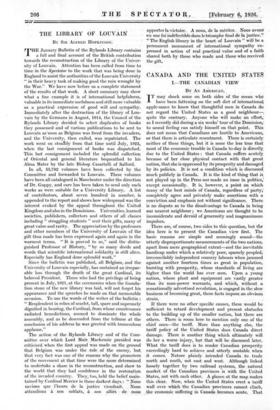T HE January Bulletin of the Rylands Library contains a full
and final account of the British contribution towards the reconstruction of the Library of the Univer- sity of Louvain. Attention has been called from time to time in the Spectator to the work that was being done in England to assist the authorities of the Louvain University " in their heavy task of making good the ruin wrought by the War." We have now before us a complete statement of the results of that work. A short summary may show what a fine example it is of international helpfulness, valuable in its immediate usefulness and still more valuable as a practical expression of good will and sympathy. Immediately after the destruction of the library of Lou- vain by the Germans in August, 1914, the Council of the Rylands Library, decided to select duplicates of books they possessed and of various publications to be sent to Louvain as'soon as Belgium was freed from the invaders, and the University, then exiled, was repatriated. The work went on steadily from that time until July, 1925, when the last consignment of books was dispatched. This last consignment included the splendid collection of Oriental and general literature bequeathed to his Alma Mater by the late Bishop Casartelli of Salford.
In all, 55,782 volumes have been collected by the Committee and forwarded to Louvain. These volumes have been all catalogued in Manchester under the direction of Dr. Guppy, and care has been taken to send only such works as were suitable for a University Library. A list of contributors, about seven hundred in number, is appended to the report and shows how widespread was the interest evoked by the appeal throughout the United Kingdom and also in the Dominions. Universities, learned societies, publishers, collectors and others of all classes including " struggling students " sent their gifts, many of great value and rarity. The appreciation by the professors and other members of the University of Louvain of the gift thus made has been expressed again and again in the warmest terms. " It is proved to us," said the distin- guished Professor of History, " by so many deeds and words that scientific international solidarity is still alive. Especially has England done splendid work."
Since the bulletin was published, all Belgium, and the University of Louvain especially, has sustained an irrepar- able loss through the death of the great Cardinal, its beloved President. Those who had the privilege of being present in July, 1921, at the ceremonies when the founda- tion stone of the new library was laid, will not forget his appearance and the speeches he made on that memorable occasion. To use the words of the writer of the bulletin : " Resplendent in robes of scarlet, tall, spare and supremely dignified in bearing, the Cardinal, from whose countenance radiated benedictions, seemed to dominate the whole assembly, and as he descended from the tribune at the conclusion of his address he was greeted with tremendous applause."
The action of the Rylands Library and of the Com- mittee over which Lord- Muir _Mackenzie presided was criticized when the first appeal was made on the ground that Belgium, was under the rule of the enemy, but that, very fact was one of the reasons why the promoters, of the movement at that time were the more determined to undertake a share in the reconstruction, and show to the world that they had , confidence in the restoration of the invaded country. They, too, held the belief main- tained by Cardinal Mercier in those darkest days : "Nous savions que Pheure, de la justice viendrait. Nous attendions a nos soldats, a nos allies de nous apporter la victoire. A nous, de la meriter. . Nous avons eu une foi indefectible dans le triomphe final de la justice." " The English library in the 'heart of Louvain " will be a permanent monument of international sympathy ex- pressed in action of real practical value and of a faith shared both by those who made and .those who received- the gift.


























































 Previous page
Previous page